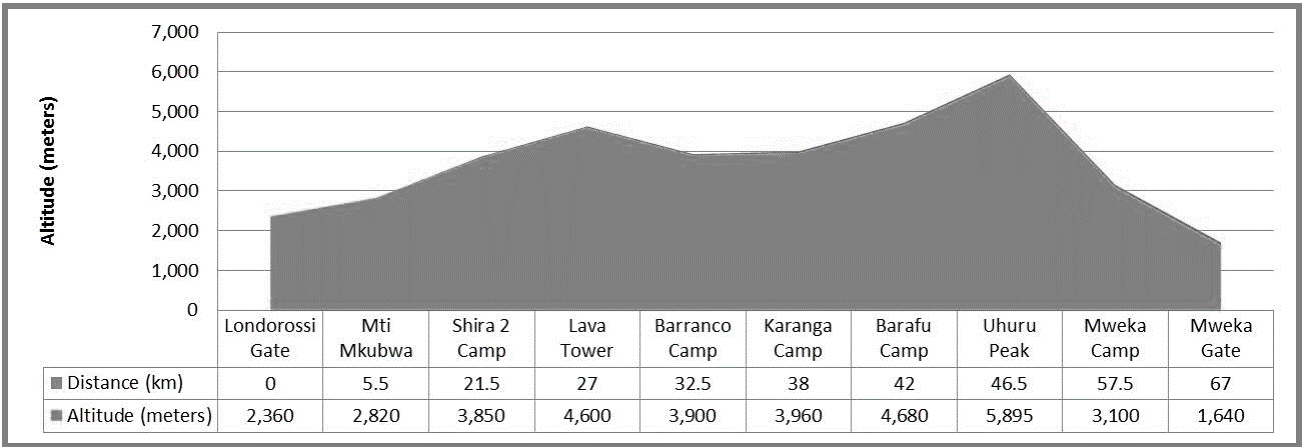Arrive in Tanzania.
You will be picked up at Kilimanjaro International Airport and transferred to your hotel in Moshi town. You will meet our guide, who will brief you on your upcoming trek and conduct an equipment check to ensure you have all the necessary mountain gear before you begin your 7-day Mount Kilimanjaro expedition via the Lemosho route. Any missing gear can be rented on this day.
Day 1: Lemosho Gate to Mti Mkubwa Camp
- Elevation: 2100m to 2780m
- Distance: 6 km
- Hiking Time: 3-4 hours
- Habitat: Rain Forest.
We depart from Moshi for Lemosho Gate, which takes about four hours, where you will complete entry formalities. After that, we drive to the Lemosho trailhead, which takes another hour to reach. Upon arrival at the trailhead, we will have lunch and then commence our trek through undisturbed forest, winding to the first campsite.
Day 2: Mti Mkubwa Camp to Shira Camp 1
-Elevation: 2780m to 3500m
-Distance: 8 km
-Hiking Time: 5-6 hours
-Habitat: Moorland.
We continue the trail leading out of the forest and into a savannah of tall grasses, heather, and volcanic rock draped with lichen beards. As we ascend through the lush rolling hills and cross several streams, we reach the Shira Ridge before gently dropping down to Shira 1 camp. The view of Kibo from across the plateau is amazing.
Day 3: Shira Camp 1 to Shira 2
-Elevation: 3500m to 3850m
-Distance: 14 km
-Hiking Time: 5-7 hours
-Habitat: Moorland.
We explore the Shira Plateau for a full day. It is a gentle walk east toward Kibo's Glacier Peak, across the plateau leading to the Shira 2 camp, situated on moorland meadows by a stream. We then continue to Moir Hut, a lesser-used site at the base of Lent Hills. Various Lent Hills offer various walks, making this an excellent acclimatization opportunity. Shira is one of the highest plateaus on Earth.
Day 4: Shira 2 Camp to Lava Tower to Barranco Camp
-Elevation: 3850m to 4600m to 3860m
-Distance: 7 km
-Hiking Time: 4-6 hours
-Habitat: Semi Desert.
From the Shira Plateau, we continue east along a ridge, passing the junction that leads to Kibo's peak. As we proceed, our path shifts southeast toward the Lava Tower, known as Sharks Tooth. Shortly after the tower, we reach the second junction, which directs us to the Arrow Glacier at 16,000 feet. We then descend to the Barranco Hut at 13,000 feet. Here, we rest, enjoy dinner, and spend the night. Although you finish the day at the same elevation as when you started, this day is vital for acclimatization and will help your body prepare for summit day.
Day 5: Barranco Camp to Karanga Camp to Barafu Camp
-Elevation: 3860 m to 4673m
-Distance: 9km
-Hiking Time: 8-10 hours
-Habitat: Alpine Desert.
After breakfast, we leave Barranco and continue along a steep ridge, passing the Barranco Wall to the Karanga Valley campsite. Next, we depart from Karanga and reach the junction that connects with the Mweka Trail. We proceed up to the Barafu Hut. At this point, you have completed the South Circuit, which provides views of the summit from various angles. Here, we camp, rest, enjoy dinner, and prepare for summit day. The two peaks of Mawenzi and Kibo are visible from this location.
Day 6: Barafu Camp to Uhuru Peak to Mweka Hut
-Elevation: 4673 m to 5895m to 3950 m
-Distance: 5 km ascent / 12 km descent
-Hiking Time: 7-8 hours ascent / 4-6 hours descent
-Habitat: Arctic
Very early in the morning, between midnight and 2 a.m., we will continue our ascent towards the summit, navigating between the Rebmann and Ratzel glaciers. We head northwesterly and climb through heavy scree towards Stella Point on the crater rim. This section of the trek is the most mentally and physically challenging.
At Stella Point (5,756 meters), we will take a short break and hopefully be rewarded with one of the most magnificent sunrises you are ever likely to see, weather permitting. The final hour of ascent to the summit from Stella Point may involve walking on snow. Upon reaching Uhuru Peak, you will have attained the highest point on Mount Kilimanjaro and the entire continent of Africa.
Faster hikers may be able to witness the sunrise from the summit. After enjoying the breathtaking views, we will begin our descent, heading directly down to the Mweka Hut campsite with a lunch stop at Barafu. It is advisable to use gaiters and trekking poles to navigate the loose gravel on the way down.
Mweka Camp is situated in the upper forest, where mist or rain can be expected in the late afternoon. Later in the evening, we will enjoy our final dinner on the mountain before settling in for a well-deserved sleep.
Day 7: Mweka Camp to Moshi
-Elevation: 3100m to 1630m
-Distance: 10 km
-Hiking Time: 3-4 hours
-Habitat: Rain Forest
After breakfast, we descend to the Mweka Park Gate to receive your summit certificates. Lower elevations can be wet and muddy, so gaiters and trekking poles will be helpful but keep rain gear and warmer clothing handy. From the gate, you will continue for another hour to Mweka Village. This marks the end of the 7-day Lemons Route Kilimanjaro trek. A vehicle will meet you at Mweka Village to drive you back to the Hotel Moshi.
Depart Tanzania.
The day is free to wind down after the trek before your flight home. Depending on flight times, you can explore Moshi town and pick up some souvenirs before heading to the airport.
*Safari, Zanzibar, and other add-ons are available to continue exploring Tanzania.









